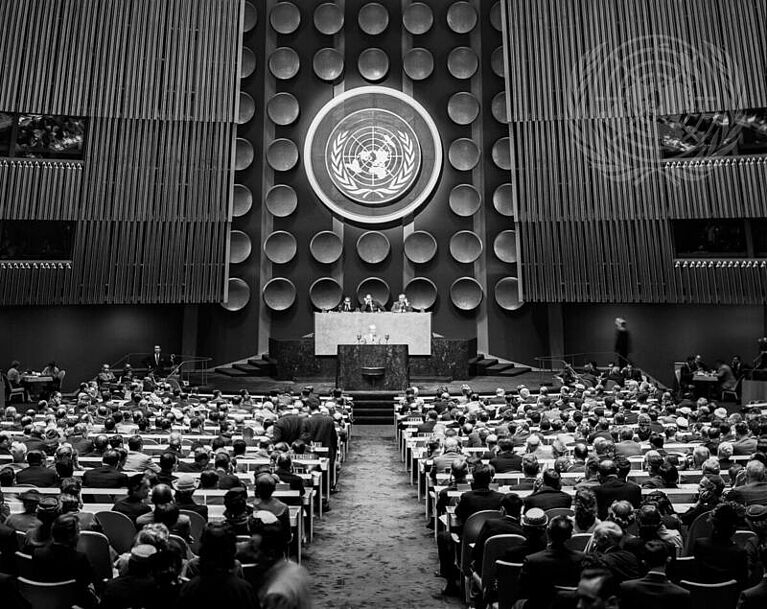"Divided Together?" International Organizations and the Cold War
Online Event (19-20 May 2021) and International Conference in Vienna (Spring 2022)
At a time of growing distrust in intergovernmental organizations, a look back at the history of international institutions can help us better understand and appreciate their role during the 20th century. Newly-available archival material of several international organizations, new oral history projects, and an ever-increasing interest of historians in the evolution of global governance call for an in-depth, personal scholarly exchange. The two-part event “Divided Together?” International Organizations during the Cold War (an online workshop in 2021 and a conference in Vienna in 2022) aims to assess the state of the field, present and discuss new and empirically-based research, and identify future research agendas and avenues for cooperation.
Despite ideological oppositions and political tensions, the second half of the 20th century has been viewed as a “golden age” of internationalism (Akira Iriye). The multiplication of international organizations and their intellectual and political influence is a sign of this juxtaposition of cooperation and competition. This paradox is summarized in Ilya Gaiduk’s phrase “divided together,” which he coined to describe the Cold War superpowers’ engagement in international organizations. To what extent did Cold War antagonisms shape the founding of these organizations? Did efforts to set up a common world organization produce lasting strife between the two blocs?
As European empires were crumbling after the war, international organizations became important arenas for negotiating the meaning and unfolding of decolonization, important actors attempting to mediate conflict and provide security, and, ultimately, arbiters of state sovereignty. Moreover, newly-decolonized states emerged as a “third bloc” and promoted alternative plans for global governance, such as the New International Economic Order (NIEO) – a 1974 call for a reordering of world trade relations and the redistribution of wealth on a global scale. To what extent were such propositions enabled, shaped, or hindered by the Cold War?
As an international bureaucracy, the UN secretariat aspires to stand above the ideological differences of its member states. At the same time, Western powers have long been the main sponsors of the organization both in terms of funding and personnel. How did this shape the outlook and practice of UN personnel? How did international civil servants conceive of their organization’s role in the defining conflict of the era? To what extent did government representatives try to influence the international civil servants and experts? How did this change over time?
As an intergovernmental organization, the UN is not merely an international bureaucracy but functions as a diplomatic forum where government representatives can publicly formulate their political goals and stage propaganda battles. Did this serve to “blow off steam” or did it in fact deepen the Cold War divide? At the same time, alongside other international organizations, the UN provided a meeting space for the exchange of ideas and the negotiation of common knowledge, norms, and practices. Did such exchanges promote a degree of cooperation and mutual understanding or did they further animosities during the Cold War?
Since history took a “global turn” in the 1990s, Cold War specialists have increasingly turned their attention to the world beyond the two superpowers and Europe. Much of that scholarship has focused on destructive proxy wars across the globe (the “Global Cold War,” as Odd Arne Westad has called it) as well as Eastern and Western competition for hearts and minds through economic aid and “soft power” initiatives. By contrast, comparatively little attention has been paid to multilateral cooperation and the superpower stand-off. The UN and its affiliated agencies and programs, have often been portrayed as paralyzed and thus irrelevant during the Cold War. We propose, however, that international organizations should be seen as important sites for Cold War competition, but also for negotiation and cooperation across the Iron Curtain – the study of which might provide important insights for our fractious times. International organizations served as vital arenas for global propaganda battles, but also as significant bridge-building sites. Rather than offering neutral space, they provided contested common ground for new global paradigms and practices to emerge – from development thinking to human rights law to disease control – that were fundamentally shaped by Cold War concerns. These global paradigms emerged from controversial discussions but took shape during careful and long-term knowledge exchanges in expert committees.
Finally, international organizations can be seen as sites of convergence, which served to facilitate the internationalization of certain issues – such as gender equality, disease control, and climate change. This conference will also examine efforts to set common standards and laws – from human rights to narcotics – at the global level.
Picture copyright: UN Photo Library
